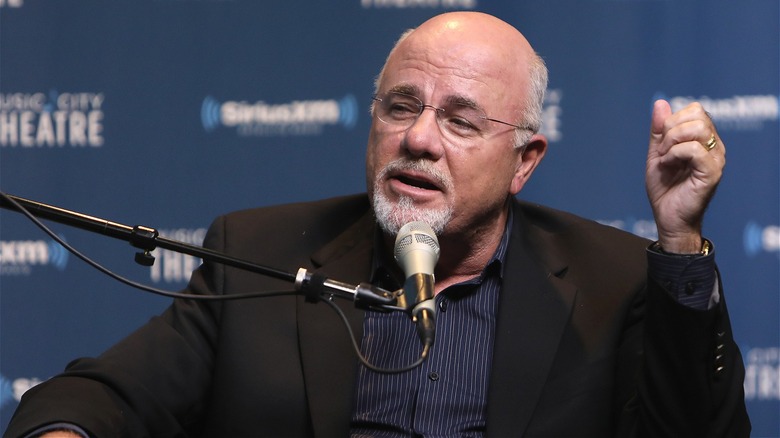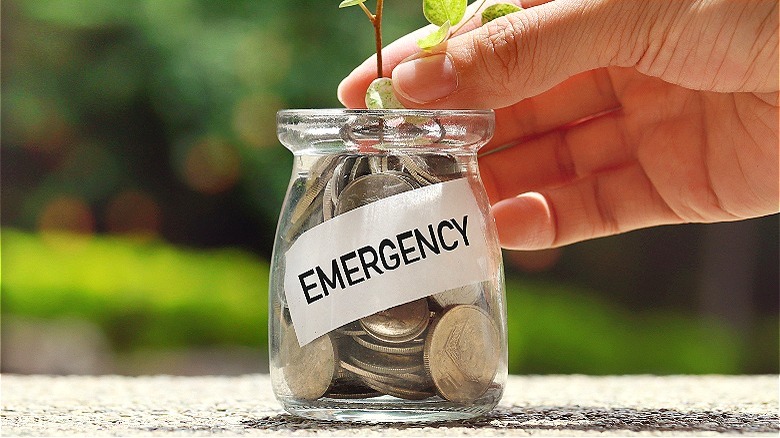What You Should Know About Dave Ramsey's Baby Steps
Perhaps the most well-known component of investor, author, and radio personality Dave Ramsey's financial advice comes in the form of his money management plan known as the 7 Baby Steps. These seven steps form the backbone of his core approach to saving, investing, and debt management, and he's a proponent of the debt snowball method, believing firmly that debt is the enemy of a life lived to the fullest.
Eighteen million weekly listeners tune in to "The Ramsey Show" to hear what Ramsey has to say about budgeting, credit card repayments, and retirement investment strategies. His 7 Baby Steps are often centrally placed within the messages he delivers; yet, with such conviction underpinning his proclamations, it can be hard to parse the good from the bad. Indeed, the baby steps act as a fantastic approach in many regards to becoming independent of credit card and other debt. But there's more to know about Dave Ramsey's approach and some of his wisdom should be taken with a grain of salt when considering your own personal circumstances.
It begins with an emergency fund
The first goal featured in Dave Ramsey's 7 Baby Steps is creating an emergency fund. Ultimately, your emergency fund should be capable of supporting three to six months' worth of expenses, but intermediate goals are required when establishing one for the first time. Your first target, according to Ramsey, should be to set aside $1,000. No matter what your financial circumstances look like today, prioritizing the creation and expansion of an emergency fund will radically transform your fiscal well-being.
According to Bankrate's 2024 annual emergency savings report, only 44% of Americans today can afford a $1,000 emergency expense. Moreover, 25% of Americans say they would rely on credit card accounts or other lending products to deal with a sudden and unavoidable expenditure. Failing to set aside cash to weather a financial storm like this means any leverage you've built up by overpaying on credit card bills and other debts is likely to be erased in an instant. Beginning to build an emergency fund might seem like a long and uphill battle, but this first baby step will set you up for long-term success as you begin to navigate Dave Ramsey's framework for financial independence.
It advocates for the debt snowball method
Once you've established an intermediate emergency savings fund, you can then begin to get serious about paying down your existing debts. Without a doubt, the priority for anyone looking to become debt-free is credit card bills. The average credit card carries an interest rate of 24.61%, far eclipsing the typical cost of auto lending, student loans, and mortgage products. Dave Ramsey suggests that all debt is bad, a sentiment that most financial experts don't agree with. However, Ramsey's war on debt is functionally on their side when it comes to prioritizing credit card repayments. These are the most expensive lending products you'll find virtually anywhere in the marketplace and therefore require decisive action and immediate attention.
Where other financial experts diverge again is in the best strategy for eliminating credit card debt. Ramsey is a proponent of the debt snowball method. In contrast to other debt payoff methods, like the avalanche (where priority is given to the highest-interest account in the avalanche approach), the debt snowball method sees you paying off your smallest balance first. By following this repayment strategy, you'll commit to paying the minimum payment on every credit card bill but your smallest account, which will receive the full weight of your budget's overpayment ability. When this balance is eliminated, you'll shift all of your overpayment focus (including that bill's minimum payment) to the next smallest balance. Then rinse and repeat, until every credit card balance has been toppled. While it's a solid strategy, to be fair to Ramsey, it won't be the best approach for everyone.
Retirement savings is less of a priority
Once you've defeated credit card debt — which will happen at a different pace for every borrower, given their circumstances — Dave Ramsey suggests returning to your emergency fund. His third baby step directs adherents to fully funding their emergency savings account, lifting its balance up to a figure that will support between three and six months of your routine expenses.
This is an admirable goal, but Ramsey often runs afoul of other professionals' advice regarding personal finance at this stage of his 7 Baby Steps. While Dave Ramsey suggests building out one's emergency fund before focusing on retirement planning, the reality is that every year you wait to save for retirement is a year you'll lose the immense weight of compounding interest supporting massive long-term growth.
Ramsey's fourth baby step, meanwhile, involves committing 15% of your household income to retirement savings, but lining this commitment up after you've paid off debts and returned to finish off your emergency fund can set you back significantly when it comes to meeting your targets. It's worth keeping in mind that others differ on this approach, and instead suggest splitting your money's attention rather than placing all your eggs in one basket in order to reach individual goals faster.
Steps 5 and 6 may not be for everyone
Dave Ramsey's fifth and sixth baby steps involve a pair of financial targets that may or may not be right for you personally. His fifth baby step will see parents begin to save for their children's college needs. It's absolutely worth considering a 529 plan or some other kind of collegiate savings program for your children, but the educational landscape has drastically changed in recent years, and there's been a loss in large part of the stigma associated with skipping college altogether.
Your children may opt for work in the trades, or might have entrepreneurial aspirations that don't require attending college. The reality is that a growing number of great careers can be forged without the associated debt that has come to dominate much of the college experience. College finances and student debt are also under the microscope at the moment, with the potential for seismic change in the way this expense is managed over the coming years.
Ramseys sixth step involves paying off the remaining balance of your mortgage. As mentioned, Ramsey believes all debt to be bad debt but many financial advisers suggest a different approach to mortgage management. Your mortgage is likely the least expensive debt product you have, and so focusing on retirement investing and other features of your financial life may be the better option depending on your personal circumstances.
Bottom line: Rigidity is never beneficial
The last step takes place once you've become debt free. Dave Ramsey says, "You know what people with no debt can do? Anything they want!" While Ramsey offers a quality framework for becoming debt free and living life with less monetary stress, his baby steps are spelled out with a rigid structure that shouldn't be strayed from, in his estimation. The reality is, is that many won't have the ability to commit 15% of their household income to retirement savings while also overpaying on the mortgage, investing in college fund accounts, and maintaining the rest of the household's monthly budget.
Moreover, life is messy — especially with children. Ramsey suggests taking out a 15-year mortgage to spur on rapid repayment rather than committing to a longer term and then pushing yourself to slay the debt. Boxing yourself into a rigid set of budgetary requirements can create additional financial hardship in the event of an emergency, and so his advice on mortgages is often thought of as some of Ramsey's worst financial advice. Rigidity is never a beneficial quality when it comes to budgeting and lifestyle management. This is true for large obligations like a series of minimum payments that add up to a solid chunk of your monthly income, and it remains the case for self-imposed financial obligations that originate in well-meaning goals.





